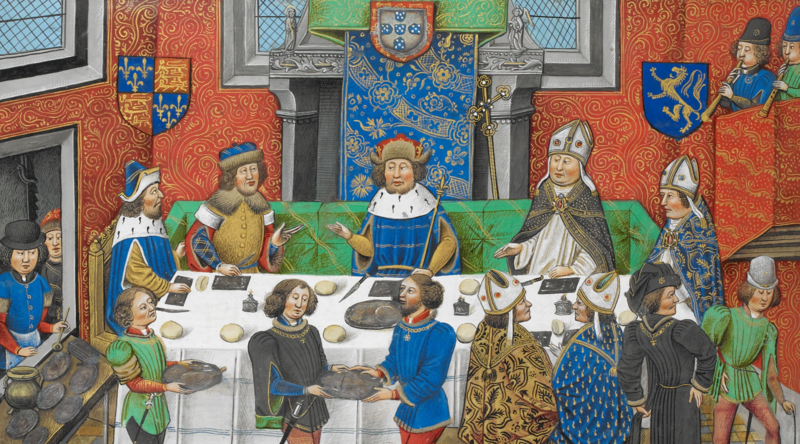Before a Dominican friar sits down for breakfast, he has already spent an hour dining at a Sacred Banquet. Between the Mass, Liturgy of the Hours, and the rosary, a friar spends the better part of three hours each day chanting and reciting the words of the psalter and the prayers of the Church. To the skeptical observer, our prayer may look like a complete waste, a thoughtless recitation of someone else’s words. But the guests at a banquet are not expected to provide their own food and drink. Instead, they share freely in the feast. So, too, in the Sacred Banquet, the heavenly feast of liturgical worship, in which we all freely share in the bounty of the Divine Word.
In the banquet of common prayer we receive our words freely, but, as good guests, we must indulge our host, savoring the pleasures of the table. The Rule of St. Augustine, the Dominicans’ book of table etiquette, if you will, offers just one line on the approach of our common prayer:
“Hoc versetur in corde quod profertur in voce.”
“Let what is professed in the voice, be turned about in the heart.” In our common prayer, Saint Augustine exhorts us not simply to say the words, but to mean what we say. Often we want the kind of prayer in which we work to lift our hearts to God, through words that spring from the depths of joyous or wrenching passion. Our efforts in prayer flow from a real desire for relationship with God, but the God we long for has invited us as friends and guests to share a place at his table, he has given us words to say. By partaking of the revealed Word of God, we make the words a part of ourselves. The suffering servant lays down among lions (Ps 57), and does he not speak of our own betrayals and wounds? The Psalmist’s soul longs and yearns for the temple (Ps 84), and do our own hearts not delight in offering fitting praise to God? The words of David and the prophets become our own, and, as we grow in familiarity with the Word of God, we gradually remove the distance between the lips and the heart.
By turning the psalms within our hearts, we come to delight in our daily bread—but food does not make a banquet. Rather, the trappings prepare us for our true delight, convivial joy and communion with our host. Saint Augustine’s guidance contains a subtle ambiguity, which invites us to dine even more sumptuously. We could render Augustine’s words: “Let what is professed in the voice abide in your heart.” Having contemplated the words of the psalms, we allow something new to abide within us: the eternal conversation between the Son and the Father.
Christ intercedes for us, tirelessly praising and petitioning God on our behalf. But he invites us to join him in his perpetual conversation with the Father. Christ “prays for us,” writes Augustine, “and prays in us, and is prayed to by us,” as our Priest, our Head, and as our God” (Exposition on Psalm 86). The Church teaches that through the Incarnation, the Son’s words to the Father have taken human form. The psalms are the Lord’s own language of prayer, human language which resonates with the stirrings of our own heart. Praying with the psalms offers us true convivial union with Jesus Christ, in which we cease to simply speak to Christ, and allow him to speak to us. The disciples recognized Christ in the breaking of the bread (Luke 24:13–35). The psalms are the breaking of the bread that makes manifest the Son already at work in us, truly abiding in our hearts.
✠
Image: John of Gaunt, Duke of Lancaster dining with the King of Portugal (Chronique d’ Angleterre)







